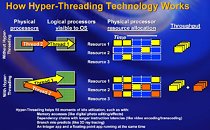- Joined
- Oct 9, 2007
- Messages
- 47,853 (7.38/day)
- Location
- Dublin, Ireland
| System Name | RBMK-1000 |
|---|---|
| Processor | AMD Ryzen 7 5700G |
| Motherboard | Gigabyte B550 AORUS Elite V2 |
| Cooling | DeepCool Gammax L240 V2 |
| Memory | 2x 16GB DDR4-3200 |
| Video Card(s) | Galax RTX 4070 Ti EX |
| Storage | Samsung 990 1TB |
| Display(s) | BenQ 1440p 60 Hz 27-inch |
| Case | Corsair Carbide 100R |
| Audio Device(s) | ASUS SupremeFX S1220A |
| Power Supply | Cooler Master MWE Gold 650W |
| Mouse | ASUS ROG Strix Impact |
| Keyboard | Gamdias Hermes E2 |
| Software | Windows 11 Pro |
A critical flaw was discovered in the way Intel implemented its simultaneous multi-threading technology, HyperThreading, on "Skylake" and "Kaby Lake" processors. Being a micro-architecture specific flaw, this could affect all implementations, from low-power mobile chips, to mainstream desktop, high-end desktop, and perhaps even enterprise-segment Xeon processors. At this time, there are no security implications of this flaw.
Intel chronicled this flaw in its micro-architecture errata "SKZ7/SKW144/SKL150/SKX150/SKZ7/KBL095/KBW095," and described it as follows: "Under complex micro-architectural conditions, short loops of less than 64 instructions that use AH, BH, CH or DH registers as well as their corresponding wider register (e.g. RAX, EAX or AX for AH) may cause unpredictable system behavior. This can only happen when both logical processors on the same physical processor are active." As an implication, Intel goes on to note that Due to this erratum, the system may experience unpredictable system behavior."

The HyperThreading flaw can be fixed through a micro-code update distributed as a UEFI firmware update. Typically, it becomes the responsibility of DIY PC motherboard, pre-built desktop, and notebook manufacturers, to distribute the update. The issue first came to light in a Debian Linux user mailing-list, although it affects all PC operating systems, not just Linux. Support groups of Debian recommend disabling HyperThreading in the UEFI setup programs of your computers as a temporary workaround, till the micro-code patch is applied. Disabling HyperThreading will reduce performance in multi-threaded apps.
View at TechPowerUp Main Site
Intel chronicled this flaw in its micro-architecture errata "SKZ7/SKW144/SKL150/SKX150/SKZ7/KBL095/KBW095," and described it as follows: "Under complex micro-architectural conditions, short loops of less than 64 instructions that use AH, BH, CH or DH registers as well as their corresponding wider register (e.g. RAX, EAX or AX for AH) may cause unpredictable system behavior. This can only happen when both logical processors on the same physical processor are active." As an implication, Intel goes on to note that Due to this erratum, the system may experience unpredictable system behavior."

The HyperThreading flaw can be fixed through a micro-code update distributed as a UEFI firmware update. Typically, it becomes the responsibility of DIY PC motherboard, pre-built desktop, and notebook manufacturers, to distribute the update. The issue first came to light in a Debian Linux user mailing-list, although it affects all PC operating systems, not just Linux. Support groups of Debian recommend disabling HyperThreading in the UEFI setup programs of your computers as a temporary workaround, till the micro-code patch is applied. Disabling HyperThreading will reduce performance in multi-threaded apps.
View at TechPowerUp Main Site
Last edited by a moderator:









